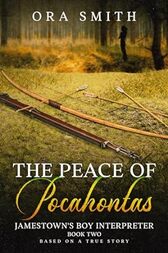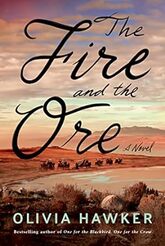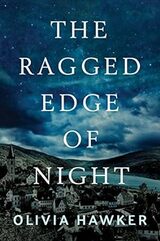 Have you ever heard of Heritage Fiction? I hadn’t until I came across Ora Smith, a genealogist who creates fascinating historical fiction based on true events involving her ancestors. I’ve read two of her novels now, and I’m fascinated at the depth of research she puts into her stories. I read White Oak River: A Story of Slavery's Secrets a while back. It’s the story of Caroline Gibson, who leaves a life of privilege on a plantation that uses slave labor to marry an abolitionist preacher, the Reverend John Mattocks. This couple is the author’s great-great-great-grandparents, from coastal North Carolina. When she gives birth to a son with dominant African traits, Caroline must decide if she’ll hold onto her bigotry at the cost of her relationships with both her husband and her son. The novel does an excellent job portraying that the Civil War may have changed laws, it failed to create a change of heart within southern society.  I just finished reading Smith’s The Peace of Pocahontas: Based on a True Story. This novel is the middle in a trilogy about Pocahontas and her role in securing peace between the Native peoples and the English colonizers. Chapters are presented in the voice of Pocahontas and of Thomas Savage, an orphan and indentured servant who lived among the Natives and served as an interpreter, and who is an ancestor of the author. It takes place in Virginia in 1613, when Pocahontas is kidnapped after three years of war. During her captivity, she learns English customs, wears English clothing, converts to Anglicanism, and marries John Rolfe. This series is a fascinating dive into a chapter in American history that most people are familiar with.  As luck would have it, I ended up reading another author in 2023 who is also writing Heritage Fiction. Olivia Hawker writes historical fiction, some of which is based on stories from her own family. One of them, The Fire and the Ore, tells the story of three women: Tabitha, Jane, and Tamar, who are all wives of Thomas Ricks, one of the early Mormon settlers in Utah Territory. Set in 1856, the novel follows Tamar Loader and her family through a brutal pilgrimage from England to Utah, when she meets the man she is sure is destined to be her husband. She agrees to a polygamous union that is threatened when the US Army invades to stop the Mormon community from engaging in what they consider illegal practices. This is a part of U.S. History that few textbooks mention.  Hawker also wrote The Ragged Edge of Night, which tells the story of her grandfather and grandmother during World War II. When the Nazis close his school for handicapped children, Franciscan friar Anton Starzmann moves to a small German hamlet to wed —in name only—a widow who needs someone to protect her and help raise her three children. He joins the Red Orchestra, an underground network of resisters plotting to assassinate Hitler, but questions his values as he finds himself falling in love with his wife. This is a tense story, filled with beauty and emotion. We all have family stories that we think would be good novels. The incidents our forebears went through were often dramatic and harrowing. I know it’s unlikely that I ever turn my family stories into novels: there’d be too many relatives who’d dispute the events or be offended by the portrayals of the people in their family. I’m glad Ora Smith and Olivia Hawker were able to overcome their worries (if they had any!) and produce such interesting windows into the past. Jennfer Bohnhoff writes historical and contemporary fiction for middle grade through adult readers. None of her books have been based on her own family. You can read more about her and her books here. For more on Ora Smith, go to her website at https://orasmith.com/ For more on Olivia Hawker, go to her website at https://www.hawkerbooks.com/ |





No comments:
Post a Comment